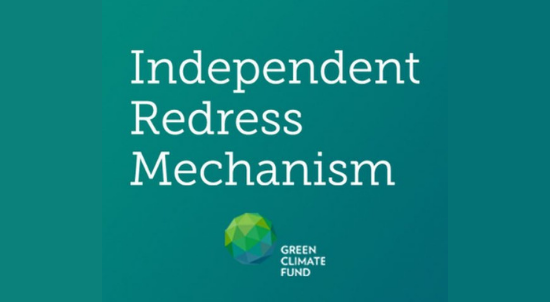AC Hosts Training for Grievance Mechanisms on Ensuring Access and Safety for Communities

Over the past over 25 years, the options for communities seeking accountability and redress for negative impacts from internationally financed projects outside of the judicial system have steadily increased. There are now dozens of non-judicial grievance mechanisms housed at the institutions that finance these projects, and the number of these mechanisms is growing every year. While it is positive that communities have increasing options for holding development banks, private financiers, and impact investors accountable for unintended environmental, labor, and social impacts, these offices are only useful if communities know about these mechanisms and feel safe raising their grievances.
On 14 July 2021, Accountability Counsel hosted an engaging conversation on the topics of accessibility and safety during the latest webinar for the Grievance Redress and Accountability Mechanism (GRAM) partnership, a community of practice led by the Green Climate Fund’s Independent Redress Mechanism that seeks to increase the capacity of grievance mechanisms around the world. The objectives of the webinar were to (1) discuss accessibility and retaliation risks from the perspective of communities who need to access grievance mechanisms; (2) highlight barriers to accessibility; and (3) provide practical recommendations to address these obstacles so that communities can more effectively access the mechanisms.
Presenters during the webinar first identified accessibility challenges and then offered concrete recommendations that grievance mechanisms can take to address them. Accountability Counsel’s Stephanie Amoako, a Senior Policy Associate, and Robi Chacha Mosenda, a Communities Associate, identified key barriers to accessibility, including: (1) information and communication challenges, such as communities not being aware of the existence of mechanisms and language barriers; (2) challenges due to cultural contexts, such as barriers to concerns of minority groups being heard; (3) challenges with technical filing requirements, including statutes of limitation and prohibitions on anonymous complaints; and (4) challenges presented by the COVID-19 pandemic, including a lack of technology access. Stephanie presented data showing the high number of complaints that are not registered or found ineligible by mechanisms of the nearly 1400 complaints to existing accountability mechanisms, which reveals some of the barriers that make grievance mechanisms inaccessible.
Robi then offered solutions and urged the participating mechanisms to ensure that complaints can be filed in any language. Highlighting examples from communities in Uganda fighting eviction due to the World Bank-funded Lubigi drainage channel, Robi also encouraged mechanisms to be sensitive to social hierarchies within communities that may prevent some affected people, like women or youth, from making their voices heard. Stephanie also discussed the experience of Haitian farmers displaced by the Caracol Industrial Park, which received funding from the Inter-American Development Bank (IDB) and other donors. The communities were able to successfully negotiate an agreement with the IDB that addresses several of the negative impacts. Their experience underscores how attention to common barriers, including literacy, transportation costs, and a lack of access to technology can help communities engage effectively in mechanism processes.
Sarah Dorman, staff attorney at the Center for International Environmental Law, discussed how with the shrinking civic space around the world, communities often face threats and instances of reprisals when voicing their concerns about projects that are often backed by powerful interests. “To prevent and respond to reprisals, trust and consistency are key,” Sarah emphasized. She highlighted important preventative measures that mechanisms should take, including allowing for confidential submission and processing of complaints as well as coordinating with complainants to address risks and security concerns.
Building on the steps that grievance mechanisms should take to protect complainants and ensure accessibility, Victoria Márquez Mees, the Chief Accountability Officer of the European Bank for Reconstruction and Development’s Independent Project Accountability Mechanism (IPAM), shared lessons from her experience leading IPAM and previously the Inter-American Development Bank’s Independent Consultation and Investigation Mechanism. Accountability Counsel’s Policy Director, Margaux Day, provided practical guidance on how the procedures of grievance mechanisms can be crafted to enshrine accessibility, including mandating a public outreach strategy, permitting complaints in various formats, providing a sample complaint template, permitting complaints about closed projects, and not requiring complainants to state too many details about a project or an investor’s policies. Margaux stated that an accessible mechanism is good for communities and investors alike, as investors benefit from hearing of issues and having an effective channel to address them.
Several webinar participants were from the accredited entities of the Green Climate Fund. All GCF accredited entities are required to establish and operate a grievance mechanism, and the GRAM partnership is helping to ensure that these mechanisms are as effective as possible. Accountability Counsel was honored to host this webinar on accessibility and retaliation risks, and we look forward to continued engagement with GRAM partners to advance the field.

